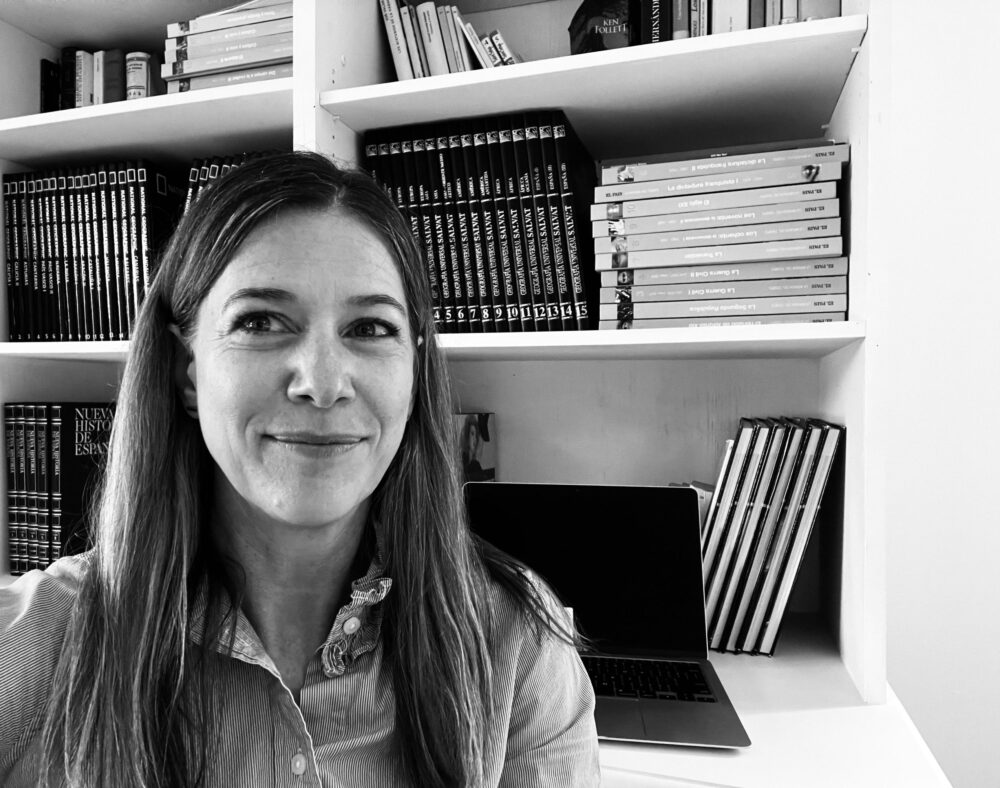This post was originally published by Just Ground.
This is the fourth installment in a series on rights holders at the UN Forum on Business and Human Rights, the annual gathering established by the UN Human Rights Council to: 1) “discuss trends and challenges” in implementation of the UN Guiding Principles on Business and Human Rights (UNGPs); 2) promote dialogue and cooperation; and 3) identify good practices. The first post revealed that, from 2018-2021, rights holders comprised only 6% of the speakers at the UN Forum, and explained that this matters because rights holders have perspectives and expertise that are essential for the dialogue that the Forum seeks to promote. The second post analyzed the data on the speakers in more detail, which suggests that entrenched disparities are sidelining rights holders. The most recent post summarized feedback from rights holders who have spoken at the Forum and concludes that it has not been an inclusive space.
This post, coming after the conclusion of the 11th UN Forum, will update the previous data, to include the information from this year. More importantly, the second half of this post will reflect on what the rights holders spoke about at the Forum this year and what that suggests about the way forward to advance business respect for human rights.
First, a quick note on the methodology. The data was acquired from the UN Forum’s official schedule, which is available online for each year. My first post explains the speaker data collection in detail and my second post covers the session data collection. In addition, the underlying data and detailed methodology are available for those who would like to explore it further. In total, data was collected on 1,636 speaking opportunities and 273 sessions at the UN Forum from 2018 to 2022.
The Numbers: UN Forum Speaker Categories and Geographic Diversity 2018-2022
As the first chart below shows, this year, with Rights Holders at the Centre as the UN Forum theme, there was marked improvement in rights holder representation; 17% of the speakers were rights holders. The chart that follows, however, indicates that, despite the progress this year, cumulatively over the past five years, rights holders have comprised only 8% of the speakers at the UN Forum. In addition, the majority of the speakers at the UN Forum have come from the United States, the United Kingdom and Western Europe. (For the breakdown by region, I used the United Nations’ regional groupings of member states, which includes the United States, United Kingdom, Canada and Australia in “Western Europe and Others.”)
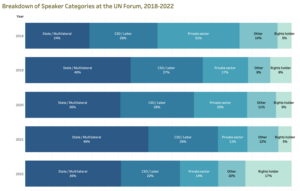
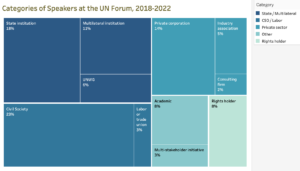
In addition, while this year showed improvement, with 80% of sessions providing information on whether interpretation was available, over the past five years, only half (49%) of the sessions had that information. Where information was available, interpretation was predominantly provided in English (105 sessions), French (99 sessions) and Spanish (81 sessions).
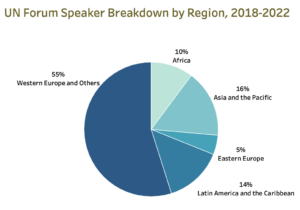
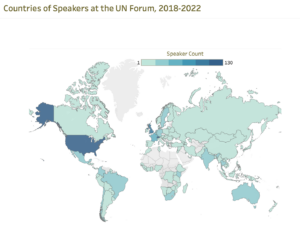
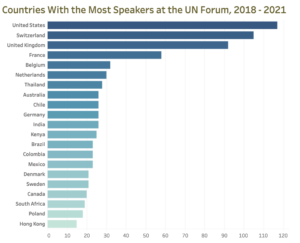
As I’ve explained in a previous post, these cumulative statistics suggest that entrenched disparities in relation to access to power and influence have played a part in sidelining rights holders at the UN Forum. This year’s improved rights holder representation shows it is possible to address these issues, and should establish a benchmark for the UN Forum going forward. Regardless of the topic, the Forum should hold space for rights holders every year, as their expertise and perspectives are essential to understanding what is happening on the ground, and what needs to happen to ensure that corporations respect human rights.
Beyond the Numbers: Rights Holders’ Perspectives
“We expect that, ‘rights holders at the center’ will not be just a slogan, but result in action.” – Yana Tannagasheva
Fernando Hopenhaym, in a podcast reflecting on the Forum this year, started by saying that her job as chair of the UN Working Group on Business and Human Rights, “is not to make anyone comfortable” but to expose how difficult it is for rights holders, so “that solutions are built from that perspective.” She noted that she heard from different rights holders that they felt that before they were outside protesting, whereas at this Forum, they “were in the room, not just as the audience, but with a mic, on the panel.” She reflected, “I think that’s a long way to go. It’s not a solution at all, but it’s a good sign.”
It is a good sign that these voices were heard, but more important that their words inspire action. As the rights holder quoted in my last post on inclusion at the UN Forum put it,
“We need to ask ourselves, how can we make those most affected by corporate human rights abuses be part of the process not as discussion points and case studies but . . . to meaningfully contribute?”
With that goal in mind, I collated themes that stood out to me from the presentations, comments and questions from the rights holders I heard speak at the Forum this year. These issues are not new. They’ve been repeatedly discussed at previous UN Forums. Which leads me to question whether anything is changing for rights holders, and how do we move beyond talk to action to address the urgency and severity of the issues they raised.
-
Assassination, threats, criminalization and judicial harassment continue against human rights defenders.
“This is not fun. We are very tired. We feel very scared to speak out like this. . . . As a woman human rights defender, I am scared to be here also.” – Nittaya Earkanna-Mee
Several rights holders, including Benito Calixto, Nada Chaiyajit, Gerald Kankya, Demetrio Pacheco Estaca, Yana Tannagasheva, and Monica Ndoen among others – spoke of the threats human rights defenders face for seeking justice and accountability for corporate human rights abuses. Two sessions of the Forum specifically addressed this issue: Defending Rights: The Essential Role of HRDs for Business Accountability and Ending the Criminalization of Indigenous Human Rights Defenders: The Way Forward. Speakers shared stories of fellow human rights defenders who have been killed or jailed and how they have faced fines, intimidation and harassment, including SLAPP suits, for their work speaking out against corporate wrongdoing and defending their communities.
-
Land confiscation and environmental destruction linked to corporate activities are tearing communities apart.
“Today we are here to listen to the realities of what corporate activities put people through.” – Theonila Roka Matbob, from her written statement read aloud at the session on Business and Human Rights in the Anthropocene.
Several rights holders, including José Manuel López, Néstor Javier Caicedo, Dulcy Maria Cotes Van- grieken, Nittaya Earkanna-Mee, and Diel Mochire Mwenge, spoke about contamination or confiscation of their land or water. They shared how these abuses have impacted their health and that of their families and neighbors, destroyed food and water supplies and livelihoods and ruptured the social fabric of their communities.
-
Accountability and remedy for corporate human rights abuses is either non-existent, or inadequate and difficult to obtain.
“If we speak, we do not have our voices heard. The companies always win.” – Néstor Javier Caicedo
Nearly every rights holder I heard speak – including Yana Tannagasheva, Benito Calixto José Manuel López, Sonia Astuhuamán Pardavé, Navarro Juarez Magdalena, Monica Ndoen, Gerald Kankya, and Demetrio Pacheco Estaca, among others – spoke about the need for effective remedy and accountability for abuses. Néstor Javier Caicedo spoke against company representatives trying to bribe impacted individuals with money rather than holistically addressing the damage caused to the community (which resonated particularly as an example of how epistemic injustice can thwart access to remedy). Several noted that governments are not respecting the laws on the books to protect their rights, while others spoke of drawn out processes of impact assessment or mediation with companies that have not yet resulted in any remediation.
-
States and business enterprises need to respect rights holder perspectives and include them in decision-making on matters that affect them.
“Our participation must be taken into account and our perspectives must be taken into consideration.” – Benito Calixto
Nearly every rights holder who spoke addressed the need for governments and business enterprises to respect rights holder perspectives, particularly with regard to what constitutes development. Many people, including Navarro Juarez Magdalena, Monica Ndoen and Diel Mochire Mwenge, also specifically referred to the need for governments to respect indigenous people’s rights to free, prior and informed consent (FPIC) before adopting or implementing measures that may affect them. Others, including Lucas Benitez, Wensislaus Fatubun, and Adrian Lasimbang also emphasized that their expertise and perspectives as rights holders offer solutions on matters like protecting marginalized workers or balancing energy needs with environmental protections, but that companies and governments are too often unwilling to listen.
-
Concrete actions are critically needed to address ongoing corporate human rights abuses.
“No more just talking only. We call on states and businesses to live up to their commitments.” Nittaya Earkanna-Mee.
All of the rights holders that I heard speak underscored a desire for immediate action to address the issues that they brought to the Forum’s attention.
As I reflect on these themes, one thing that stands out to me the most is how the severity of the issues that rights holders raised often seemed jarringly at odds with what seemed like a repeated emphasis by other stakeholder groups on collaboration as a way forward. How do you collaborate with the entity that has threatened your family, poisoned your land and refused to listen to your perspective? These starkly different narratives on where corporations stand in relation to respecting human rights is troubling, especially in light of my last post, which shared that rights holders who have spoken at the Forum in the past expressed a desire for constructive dialogue and accountability.
To me, this dissonance at the UN Forum this year embodies the central problem with the UNGPs. That is, in the words of Prof. Tara J. Melish, their “failure to offer any express tools or legal resources to affected communities such that rights-holders themselves have the power and capacity to engage the causes of their own abuse.” Instead, the UNGPs’ underlying premise is that elite acceptance of their norms will lead corporations to voluntarily become “human rights leaders as a matter of constructed self-identity.” As a result, companies are free to adopt “highly formalistic uptake practices . . . while failing to engage in any genuine ground-level operational change.”
Rights holders’ testimony at the Forum this year threw this central weakness of the UNGPs into sharp relief. And perhaps that is an inevitable outcome of a UN Forum with rights holders at the center. The question is – what’s next? How do we work with or beyond the UNGPs and support rights holders in their struggles and visions for accountability and remedy? I hope that, in the future, the UN Forums asks these hard questions and keeps rights holders at the center to help find the answers.
